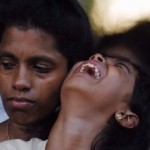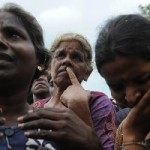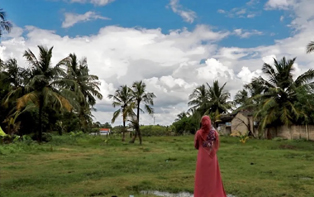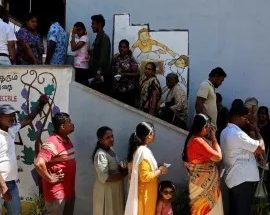தமிழாக்கம் றஞ்சி( சுவிஸ்)
 |
போருக்குப் பின்னர் வடக்குக் கிழக்கில் வாழும் தமிழ்ப் பெண்கள் பெரும் பாதுகாப்பு நெருக்கடிகளை எதிர்நோக்கி வருகின்றனர் என அனைத்துலக நெருக்கடிகளுக்கான அமைப்பின் அறிக்கையில் கவலை தெரிவிக்கப்பட்டுள்ளது.போர் முடிவடைந்து இரு வருடங்களுக்கு மேலாகியும் பல பெண்கள் இன்னும் அரச தரப்பினதும் தமது சொந்த சமூகத்தினதும் வன்முறைகள் குறித்த பயப் பீதியுடனேயே வாழ்ந்து வருவதாக, |
போருக்குப் பின்னர் வடக்குக் கிழக்கில் வாழும் தமிழ்ப் பெண்கள் பெரும் பாதுகாப்பு நெருக்கடிகளை எதிர்நோக்கி வருகின்றனர் என அனைத்துலக நெருக்கடிகளுக்கான அமைப்பின் அறிக்கையில் கவலை தெரிவிக்கப்பட்டுள்ளது.போர் முடிவடைந்து இரு வருடங்களுக்கு மேலாகியும் பல பெண்கள் இன்னும் அரச தரப்பினதும் தமது சொந்த சமூகத்தினதும் வன்முறைகள் குறித்த பயப் பீதியுடனேயே வாழ்ந்து வருவதாக, அனைத்துலக நெருக்கடிகளுக்கான அமைப்பின் இலங்கை திட்ட நிர்வாக அதிகாரியும் முதன்மை ஆய்வாளருமான அலன் கீனன் தெரிவித்துள்ளார்.
இலங்கையின் இனமுரண்பாடுகள் பெண்கள் தொடர்பான சமூகக் கட்டமைப்புகளை பெரிதும் பாதித்துள்ளது. இவர்களைப் பாதுகாப்பதற்கும் அதிகாரங்களை வழங்குவதற்குமான உடனடி நடவடிக்கையின் அவசியம் குறித்தும் அலன் கீனன் வலியுறுத்தியுள்ளார்.இராணுவமயம் ஆக்கப்பட்டு, முற்று முழுதாக சிங்கள இராணுவ ஆண்களைக் கொண்ட படையினரால் நிர்வகிக்கப்பட்டுவரும் பகுதிகளில் வாழும் பெண்கள், பாதுகாப்பு, பாதுகாப்பு உணர்வு, உதவி கோருதல் போன்ற விடயங்களில் பெரும் பிரச்சனைகளை எதிர்கொண்டு வருகின்றனர்.தாம் எதிர்கொள்ளும் பிரச்சனைகள் குறித்து முறையிடுவதற்குகூட எவ்வித கட்டமைப்புகளும்; அமைப்புக்களும் அங்கு இல்லை. இலங்கை அரசாங்கமும் கூட இவர்களது பாதுகாப்பு நிலை குறித்து எவ்வித நடவடிக்கையும் எடுப்பதில்லை. சர்வதேச சமூகமும் இப் பெண்கள் எதிர்கொள்ளும் சவால்கள் குறித்து எந்தவித அக்கறையும் காட்டவில்லை என அனைத்துலக நெருக்கடிகளுக்கான அமைப்பு குற்றம் சுமத்தியுள்ளது.
 மேலும் இவ் அறிக்கை யில் தெரிவிக்கப்பட்டுள்ளதாவது –விடுதலைப் புலிகளுக்கும் அரசுக்கும் இடையிலான 30 வருட போராட்டம் பல்லாயிரக் கணக்கான பெண்களை, குடும்ப பாரத்தை தனித்துச் சுமக்கவேண்டிய நிலைக்குத் தள்ளியுள்ளது. தடுத்து வைக்கப்பட்டுள்ள மற்றும் காணாமற்போன தமது குடும்ப உறவுகளையிட்டும் வறுமை மற்றும் இடப்பெயர்வு போன்ற புற நிலைமைகளோடும் தினமும் போராட வேண்டிய நிலைக்கு இப் பெண்கள் தள்ளப்பட்டுள்ளனர். பூரண இராணுவமயப்படுத்தலும், அரசின் புறக்கணிப்பும், இப்பகுதிகளில் சிவில் நிர்வாகக் கட்டமைப்புகள் இயங்கமுடியாது இருப்பதும் பெண்கள் தொடர்பான சமூக அவலங்களை மேலும் சிக்கலாக்கியுள்ளன.பெண்கள் மீதான வன்முறைகளும் விருப்பத்திற்கு மாறாக பாலியல் தொழிலிலும், பாலியல் உறவுகளிலும் தள்ளப்பட்டுவரும் நிலையும் தற்போது அதிகரித்து வருகின்றன. பெண்கள் மீதான துஷ்பிரயோகங்களும் தமிழ் சமூகத்தில் மீண்டும் மேலோங்கிவரும் ஆணாதிக்க சிந்தனைகளும் கல்வி, வேலைவாய்ப்பு போன்ற விடயங்களில் பெண்களின் நிலையை மேலும் சிக்கலாக்கி வருகின்றன. நாளாந்த தேவைகளுக்கு இராணுவத்தில் தங்கியிருக்க வேண்டிய நிலை அவர்கள் மீதான வன்முறைக்கு காரணமாவதுடன் அவர்களது சமூக ஆளுமை விருத்தியையும் தடுத்து வருகிறது என அலன் கீனன் மேலும் தெரிவித்துள்ளார்.
மேலும் இவ் அறிக்கை யில் தெரிவிக்கப்பட்டுள்ளதாவது –விடுதலைப் புலிகளுக்கும் அரசுக்கும் இடையிலான 30 வருட போராட்டம் பல்லாயிரக் கணக்கான பெண்களை, குடும்ப பாரத்தை தனித்துச் சுமக்கவேண்டிய நிலைக்குத் தள்ளியுள்ளது. தடுத்து வைக்கப்பட்டுள்ள மற்றும் காணாமற்போன தமது குடும்ப உறவுகளையிட்டும் வறுமை மற்றும் இடப்பெயர்வு போன்ற புற நிலைமைகளோடும் தினமும் போராட வேண்டிய நிலைக்கு இப் பெண்கள் தள்ளப்பட்டுள்ளனர். பூரண இராணுவமயப்படுத்தலும், அரசின் புறக்கணிப்பும், இப்பகுதிகளில் சிவில் நிர்வாகக் கட்டமைப்புகள் இயங்கமுடியாது இருப்பதும் பெண்கள் தொடர்பான சமூக அவலங்களை மேலும் சிக்கலாக்கியுள்ளன.பெண்கள் மீதான வன்முறைகளும் விருப்பத்திற்கு மாறாக பாலியல் தொழிலிலும், பாலியல் உறவுகளிலும் தள்ளப்பட்டுவரும் நிலையும் தற்போது அதிகரித்து வருகின்றன. பெண்கள் மீதான துஷ்பிரயோகங்களும் தமிழ் சமூகத்தில் மீண்டும் மேலோங்கிவரும் ஆணாதிக்க சிந்தனைகளும் கல்வி, வேலைவாய்ப்பு போன்ற விடயங்களில் பெண்களின் நிலையை மேலும் சிக்கலாக்கி வருகின்றன. நாளாந்த தேவைகளுக்கு இராணுவத்தில் தங்கியிருக்க வேண்டிய நிலை அவர்கள் மீதான வன்முறைக்கு காரணமாவதுடன் அவர்களது சமூக ஆளுமை விருத்தியையும் தடுத்து வருகிறது என அலன் கீனன் மேலும் தெரிவித்துள்ளார்.
போரின்போது பெண்கள் மீது இராணுவத்தால் மேற்கொள்ளப்பட்ட பாலியல் ரீதியான வன்முறைகள் குறித்து பல்வேறு குற்றச்சாட்டுகள் முன்வைக்கப்பட்டன. தற்போது வெளியாகியுள்ள நல்லிணக்க ஆணைக்குழுவின் அறிக்கையில்கூட பெண்கள் மீதான இவ்வன்முறைகள் குறித்து பெரியளவில் எதுவும் குறிப்பிடப்படவில்லை.கொல்லப்பட்ட விடுதலைப் புலிகளின் பெண் போராளிகளது உடல்கள் சிங்கள படைத்தரப்பினரால் ஆடைகள் களையப்பட்டு அவமானப்படுத்தப்பட்டமை குறித்தும் இறந்த உடல்கள் பற்றி பாலியல் ரீதியாக தெரிவிக்கப்பட்ட அவமானகரமான கருத்துகள் குறித்தும் மட்டுமே மேலுமொரு ‘சுயாதீன விசாரணை’ அவசியம் என நல்லிணக்க ஆணைக்குழு பரிந்துரைத்துள்ளது. இது தொடர்பாக வெளியிடப்பட்ட காணொளிகளை அரச தரப்பினர் தொடர்ந்தும் போலியானவை என நிராகரித்து வருகின்றனர். நல்லிணக்க ஆணைக்குழு போரின்போது இடம்பெற்ற பிரச்சனைகள் சிலவற்றை ஏற்றுக்கொண்டுள்ளதுடன் இது குறித்து சில நல்ல பரிந்துரைகளையும் முன்வைத்துள்ளது. ஆனாலும் இடம்பெற்ற வன்முறைகள் குறித்து அரச தரப்பினரின் கருத்துகளை கேள்விக்குள்ளாக்க ஆணைக்குழு முற்றாகத் தவறியுள்ளது என அனைத்துலக நெருக்கடிகளுக்கான அமைப்பின் ஆசிய திட்ட இயக்குனர் றொபேட் ரெம்பிளர் தெரிவித்துள்ளார்.
வடக்கு கிழக்கில் பெண்கள் எதிர்கொண்டுவரும் பாதுகாப்பு பிரச்சனைகளைக் கையாள்வதற்கு அரசாங்கத்தினதும் சர்வதேச அமைப்புக்களதும் அரசியல் ரீதியான விருப்பும் நிதிவளமும் அவசியம். தவிர, பெண்கள் மீதான பாலியல் வன்முறைகள் குறித்து பொறுப்பேற்பதும் வெளிப்படைத் தன்மையும் இவ்விடயத்தில் அவசியமானது. இதனைச் செய்யத் தவறின் மீண்டும் வன்முறைகள் வெடிப்பதற்கான நிலைமைகள் உருவாகும் எனவும் அனைத்துலக நெருக்கடிகளுக்கான அமைப்பு எச்சரித்துள்ளது.
Sri Lanka: Women’s Insecurity in the North and East
Asia Report N°217 20 Dec 2011
EXECUTIVE SUMMARY AND RECOMMENDATIONS
Women in Sri Lanka’s predominantly Tamil-speaking north and east are facing a desperate lack of security in the aftermath of the long civil war. Today many still live in fear of violence from various sources. Those who fall victim to it have little means of redress. Women’s economic security is precarious, and their physical mobility is limited. The heavily militarised and centralised control of the north and east – with almost exclusively male, Sinhalese security forces – raises particular problems for women there in terms of their safety, sense of security and ability to access assistance. They have little control over their lives and no reliable institutions to turn to. The government has mostly dismissed women’s security issues and exacerbated fears, especially in the north and east. The international community has failed to appreciate and respond effectively to the challenges faced by women and girls in the former war zone. A concerted and immediate effort to empower and protect them is needed.
Thirty years of civil war between the government and Liberation Tigers of Tamil Eelam (LTTE) has resulted in tens of thousands of female-headed households in the north and east. Families throughout those areas experienced many waves of conflict, displacement and militarisation. In the war’s final stages in 2008 and 2009, hundreds of thousands of civilians in the northern Vanni region endured serial displacements and months of being shelled by the government and held hostage by the LTTE, after which they were herded into closed government camps. Most lost nearly all possessions and multiple family members, many of whom are still missing or detained as suspected LTTE cadres. When families eventually returned to villages, homes and land had been destroyed or taken over by the military. There was less physical destruction in the east, which was retaken by the government in 2007, but those communities have also suffered and now live under the tight grip of the military and central government.
These events have left women and girls vulnerable at multiple levels. In the Vanni in particular, their housing is inadequate, and they have limited means of transportation and employment opportunities. Many do not have sufficient funds to feed their families, let alone to care for those who were maimed or disabled in the war. The continuing search for the missing and the struggle to maintain relations with the detained are further strains. Children’s education was severely disrupted for years, and many are only slowly returning to school. The trauma of the war, especially the final months in 2009, is evident in every family. The conflict has badly damaged the social fabric.
The consequences for women and girls have been severe. There have been alarming incidents of gender-based violence, including domestic violence within the Tamil community, in part fuelled by rising alcohol use by men. Many women have been forced into prostitution or coercive sexual relationships. Some have also been trafficked within the country and abroad. Pregnancies among teenagers have increased. Fear of abuse has further restricted women’s movement and impinged on education and employment opportunities. The fact that women must rely on the military for everyday needs not only puts them at greater risk of gender-based violence, but also prevents them from building their own capacity within communities. The island-wide spate of attacks on women by individuals labelled “grease yakas (devils)”, which reached the north and east in August and into September 2011, and the lack of serious response by the security forces (except to brutally crack-down on protesters across the north and east, and especially in Jaffna), exposed the near-complete collapse of trust in law enforcement.
Militarisation and the government’s refusal to devolve power or restore local civilian administration in the north and east have directly contributed to this complex societal distress, which comes on the heels of the collapse of the repressive regime run by the LTTE. Over decades, the Tigers created an elaborate coercive structure around which people organised their lives. The absence of this structure has left many adrift. While this has had some important positive consequences, including for women, the devastation of the final year of war and the replacement of the LTTE in effect by the military and its proxies negate the gains for these communities. The experience and perception of pervasive insecurity are having profound harmful effects on women’s lives.
Instead of recognising these vulnerabilities and taking steps to protect women and girls, the government has largely ignored them. The heavily militarised and centralised systems of control in the north and east exclude most residents, but especially women from decisions that affect their security. While there are some female civilian officials and some programs nominally directed at women, all activities occur within a male, Sinhalese, military structure. The government has constrained access for international humanitarian organisations and even more so for local civil society. The vision of security the government has pursued is a masculine, militarised one. Human security is lacking.
The current situation in the north and east comes in the wake of serious accusations of sexual violence by the military against Tamil women at the end of the war and in the months thereafter. There is credible evidence to support some of these accusations. Yet cultural stigma, decades of impunity, and the government’s refusal to allow any independent investigation of the end of the war and its aftermath make it impossible to determine the full extent of misconduct. In a well-known rape case in the north in June 2010, criminal prosecution has been pending for eighteen months against four soldiers following concerted pressure from local women’s groups. But this is a striking exception.
The government’s overwhelming response to allegations of sexual violence has been to reject them, as it has done with video footage that shows what appears to be Sinhalese soldiers making sexual comments while handling the dead, naked bodies of female suspected LTTE fighters, some of whom have their hands bound. The long-awaited report of the government’s Lessons Learnt and Reconciliation Commission (LLRC) was delivered to the president on 20 November 2011 and released to the public on 16 December. Among its recommendations is one that the government initiate yet another “independent investigation” into the footage, which officials repeatedly have said was “faked”. Another government assessment of it now – without a complementary international one focused on alleged sexual violence – risks further feeding Tamil fears of such violence and the exploitation of those fears by some diaspora activists.
The international response to women’s insecurity has been unnecessarily muted. Not only have Sri Lanka’s international partners, including the United Nations, failed to speak out publicly and clearly about threats to women and allegations of abuse, but they have agreed to work within militarised structures that have amplified vulnerability and reduced transparency. Unless they do more to demand changes to those structures and to target funding and assistance at initiatives that can help protect and empower women, their engagement will be ineffectual, at best.




“பேய் அரசாண்டால் பிணம் தின்னும் சாத்திரங்கள்” என்ற பாரதியின் வரிதான் என் நினைவுக்கு வருகிறது. மிக்க வேதனை தரும் பதிவு. யாராலும் அதிகம் (அவ்வளவாய்க்) கண்டுகொள்ளப்படாத இப்பிரச்சினை குறித்து “ஊடறு”வேனும் அடிக்கடி குரல் எழுப்பி வருவது ஆறுதல் அளிக்கிறது. பாராட்டுக்கள்!